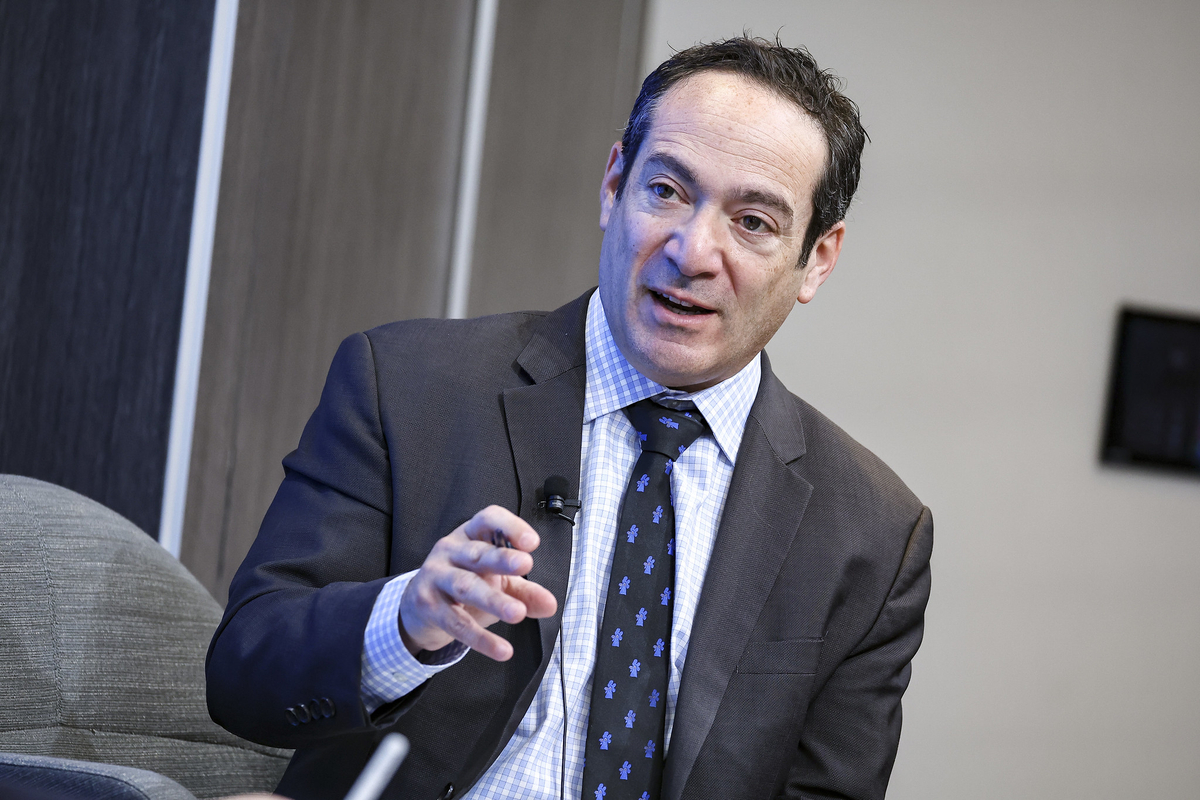WASHINGTON DC – Russia’s war in Ukraine is merely the most visible front in a relentless and expanding Kremlin campaign to undermine democracies in the region. According to Jonathan Katz, a fellow in governance studies at the Washington-based Brookings Institution and co-editor of the 2025 Democracy Playbook, Russia has never stopped its influence operations – a hybrid war that targets countries within the European Union and NATO, as well as those seeking deeper Western integration.
These operations are not ancillary to the war; they are vital to Moscow’s strategic objective of destabilizing democracies and damaging critical multilateral organizations like NATO.
Follow our coverage of the war on the @Kyivpost_official.
In an interview with Kyiv Post on Tuesday, Katz laid bare the latest vast strategic campaign undermining key states: brazen election interference in Moldova, illiberal networks in the Czech Republic, and democratic sabotage in Georgia – all fueled by a deluge of Russian disinformation.
Global scope of Russia’s strategic goals
Katz emphasizes that Russia’s influence operations are expansive, seeking to impact the internal situations in nations ranging from Moldova and its recent elections to the Czech Republic and its recent elections, as well as its relationship with unfortunately backsliding countries like Georgia.
The Kremlin’s tactics – which include disinformation, misinformation, and direct electoral interference – all “serve the objective of destabilizing democracies and cultivating political partners.”

Other Topics of Interest
Monobank Developer Becomes Ukraine’s First Fintech ‘Unicorn’ After US Fund Investment
Fintech-IT Group, the developer behind Monobank, reached $1 billion in value thanks to an investment from the Ukraine-Moldova American Enterprise Fund, its first external backer.
“The goal is to find allies in government – like Viktor Orbán in Hungary or Robert Fico in Slovakia – to advance Russia’s objectives and, crucially, to damage critical multilateral organizations like NATO that are essential to transatlantic security and defense,” he explained.
These objectives have not stopped, even with an ongoing conflict in Ukraine, where Russia doesn’t seem to be winning.
“Indeed, even in a scenario that seems to be a stalemate, with the Russian economy faltering, Russia continues these efforts because it believes they advance its strategic objectives,” he added.
Moldova’s courage: A case study in resilience
Amidst this relentless Russian pressure, Moldova stands out as a critical success story. The nation recently countered a significant Russian influence campaign involving illicit finance and “matryoshka” disinformation aimed at causing a parliamentary shift that would halt the country’s bid for EU membership.
“Moldova is a success story, and it’s continuing on the trajectory its people want: further integration into the EU and maintaining a democratic path with transparency, accountability, and a rejection of corruption,” Katz said,
According to him, the Moldovans showed a lot of courage to step up and reject a significant disinformation campaign. The population rejected attempts at vote buying and Russian-connected candidates who would have steered the country away from its democratic path.
Katz asserts that the credit goes to the Moldovan people. After two elections in a row, they now know there is an overt and massive attempt to influence and shape their future.
He believes Moldovans are awake about the threats against them. They successfully overcame so much to ensure their country moves in the right direction, which is an incredibly powerful example for democracies in Europe and globally.
Georgia’s backsliding: Illiberal playbook
The situation in Georgia presents a starkly different and concerning picture. Despite consistent polling showing that Georgians want democracy and would like to further integrate into Euro-Atlantic institutions, the current Georgian Dream government appears to be deliberately undermining that path.
Katz unpacks the signs of this democratic backsliding, noting, for example, that “you can see copycat versions of Russia’s ‘Foreign Agents’ law being used, or crackdowns on civil society and independent voices.”The current government’s actions, according to Katz, are largely about maintaining power at all costs. He observes that this playbook has been used across the globe, including nearby in countries like Hungary – power grabs similar to what we saw in Russia when Putin came to power.
“Therefore, it’s not only about Russia sharing its playbook; it’s also about Viktor Orbán sharing the playbook with Georgian Dream. These are networks of illiberals seeking to undermine democracy and democratic change,” he emphasized.
In Georgia’s case, the “Foreign Agents” law is clearly very reminiscent – if not copied verbatim – of Russia’s. Its effect is to target those who offer alternative perspectives and to enact state capture, further distancing the nation from the European Union and NATO.
Katz concludes: “It’s truly unfortunate because it’s not in the interest of what the Georgian people say they want, but it is a political party and a government that has taken Georgia down this path and further away from the European Union, NATO, and the US.”
Czech Republic: A new vulnerability
Even in the more resilient Czech Republic, Russia’s disinformation machine has been hard at work. Ahead of last week’s elections, investigations revealed a group of 16 Russia-linked websites producing more content – basically disinformation – than all Czech traditional media outlets combined in the digital space.
Furthermore, analysts identified hundreds of TikTok accounts promoting pro-Russian narratives that were garnering millions of views per week before the election.While the final outcome is not yet certain, Katz suggests that the political shift will be viewed favorably by the Kremlin.
“Russia’s goal has been to essentially break up NATO, make it difficult for the EU to function, and to also close the door on countries like Ukraine and Moldova and Georgia,” he said.
Therefore, Katz believes, anytime you have a country in the EU and NATO that has a prime minister or elected leader who is more favorable to Russia, for Putin, that’s a good thing.
He warns, however, that the story in the Czech Republic is “not completely written, given the strong pro-Western support from President Pavel and a persistent transatlantic community within the country.”
Critical lessons for the US
Drawing on the diverse outcomes in Moldova, Georgia, and the Czech Republic, Katz asserts that the most critical lesson for Washington is that the US has to be “and should be actively engaged in countering and responding to disinformation and hybrid aggression coming from Russia.”
He criticizes the current US posture: “Unfortunately, the US has pulled back from its leading role in support of democracies globally, independent media, and civil society organizations on the front line of countering this type of disinformation and misinformation.”
This lack of engagement is not merely an inconvenience; it’s a national security concern, according to Katz.
He explained: “It’s because US national security, economic, and political interests are impacted by threats from foreign adversaries, including Russia, China, Iran, North Korea, and others.”
Instability caused by autocrats and democratically backsliding countries closer to adversaries becomes a threat to our national and economic security.
Katz issues a stark warning, referencing recent military aggressions: “These things add up. Mr. Putin is testing the US.”
“And when there is nothing more than a rhetorical response, it’s concerning for the safety and security – not only of our European partners, but the US as well,” he concluded.
